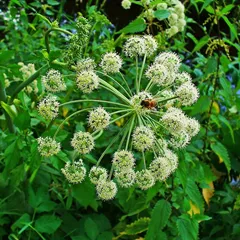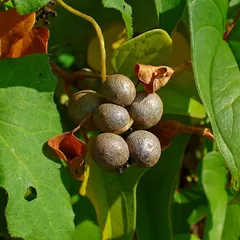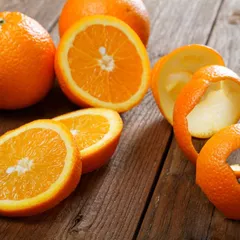An Tai Zhu Gao
Chinese: 安胎主膏
Pinyin: Ān Tāi Zhǔ Gāo
Other names: Fetus-Quieting Plaster








An Tai Zhu Gao
Chinese: 安胎主膏
Pinyin: Ān Tāi Zhǔ Gāo
Other names: Fetus-Quieting Plaster
Ingredients: 14 herbs
Category: External formulas for Internal disorders
- Strengthens the Qi and Blood
- Tonifies the Liver and Kidneys
- Calms the fetus
Source: Rhymed Prose on [Medical] Principles and Applications (1879 AD )
The information provided here is not a replacement for a doctor. You shouldn't use it for the purpose of self-diagnosing or self-medicating but rather so you can have a more informed discussion with a professional TCM practitioner.
An Tai Zhu Gao is a 14-ingredient Chinese Medicine formula with Codonopsis Roots (Dang Shen) and Dong Quai (Dang Gui) as principal ingredients.
Invented in 1879 AD, it belongs to the category of external formulas for Internal disorders. Its main actions are: 1) strengthens the Qi and Blood and 2) tonifies the Liver and Kidneys.
In Chinese Medicine health conditions are thought to arise due to "disharmonies" in the body as a system. These disharmonies are called "patterns" and the very purpose of herbal formulas is to fight them in order to restore the body's harmony.
From a Western Medicine standpoint, such patterns can give rise to a range of conditions such as restless fetus for instance.
On this page, after a detailed description of each of the fourteen ingredients in An Tai Zhu Gao, we review the patterns and conditions that An Tai Zhu Gao helps treat.
The fourteen ingredients in An Tai Zhu Gao

Dang Shen is a king ingredient in An Tai Zhu Gao. Like the name indicates, it means it has more power than other ingredients in the formula.
1. Codonopsis Roots (Dang Shen)
In general Dang Shen's main actions are as follows: "Tonifies the Spleen and Lung Qi. Assists in the secretion of Bodily Fluids."
In the context of An Tai Zhu Gao, it is used because it tonifies the Spleen and Lung Qi.

Dang Gui is a king ingredient in An Tai Zhu Gao. Like the name indicates, it means it has more power than other ingredients in the formula.
2. Dong Quai (Dang Gui)
Part used: Dried root
Nature: Warm
Meridian affinity: HeartLiverSpleen
Category: Tonic herbs for Blood Deficiency
In general Dang Gui's main actions are as follows: "Tonifies the Blood. Lubricates the Intestines. Relieve constipation. Promotes circulation and dispels Bi Pain. Reduce Dysmenorrhea and help with irregular menstruation."
In the context of An Tai Zhu Gao, it is used because it Tonifies the Blood.

Shu Di huang is a deputy ingredient in An Tai Zhu Gao. This means it helps the king ingredient(s) treat the main pattern or it serves to treat a coexisting pattern.
3. Prepared Rehmannia (Shu Di huang)
Part used: Prepared dried root tuber
Nature: Warm
Taste(s): Sweet
Meridian affinity: KidneyLiver
Category: Tonic herbs for Blood Deficiency
In general Shu Di huang's main actions are as follows: "Tonifies the Blood. Tonifies the Yin of the Kidneys."
In the context of An Tai Zhu Gao, it is used because it tonifies the Blood and the Kidney Yin.

Shan Yao is a deputy ingredient in An Tai Zhu Gao. This means it helps the king ingredient(s) treat the main pattern or it serves to treat a coexisting pattern.
4. Yam (Shan Yao)
Part used: Dried rhizome
Nature: Neutral
Taste(s): Sweet
Meridian affinity: KidneyLungSpleen
Category: Tonic herbs for Qi Deficiency
In general Shan Yao's main actions are as follows: "Tonifies the Spleen and Stomach. Tonifies the Lung Qi and nourishes the Lung Yin. Nourishes the Kidneys and consolidates Jing."
In the context of An Tai Zhu Gao, it is used because it tonifies the Qi of Lungs, Spleen and Stomach.

Bai Zhu is a deputy ingredient in An Tai Zhu Gao. This means it helps the king ingredient(s) treat the main pattern or it serves to treat a coexisting pattern.
5. Atractylodes Rhizomes (Bai Zhu)
Part used: Dried rhizome
Nature: Warm
Meridian affinity: SpleenStomach
Category: Tonic herbs for Qi Deficiency
In general Bai Zhu's main actions are as follows: "Tonifies the Spleen Qi. Fortifies the Spleen Yang and dispels Damp through urination. Tonifies Qi and stops sweating. Calms restless fetus when due to Deficiency of Spleen Qi."
In the context of An Tai Zhu Gao, it is used because it tonifies the Spleen Qi. It also calms restless fetus when due to Deficiency of Spleen Qi..

Chen Pi is a deputy ingredient in An Tai Zhu Gao. This means it helps the king ingredient(s) treat the main pattern or it serves to treat a coexisting pattern.
6. Tangerine Peel (Chen Pi)
In general Chen Pi's main actions are as follows: "Warms the Spleen and regulates the Middle Burner Qi. Dries Dampness and disperses Phlegm from the Lungs and Middle Burner. Reduces the potential for Stagnation caused by tonifying herbs."
In the context of An Tai Zhu Gao, it is used because it warms the Spleen and regulates the Middle Burner Qi. .

Zi Su Geng is a deputy ingredient in An Tai Zhu Gao. This means it helps the king ingredient(s) treat the main pattern or it serves to treat a coexisting pattern.
7. Perilla Stems (Zi Su Geng)
Part used: The stem
Nature: Warm
Taste(s): Pungent
Meridian affinity: SpleenStomachLung
Category: Herbs that regulate Qi
Zi Su Geng invigorates Qi in the Middle Burner and relieves pain. It also calms the fetus and prevents miscarriage.

Du Zhong is a deputy ingredient in An Tai Zhu Gao. This means it helps the king ingredient(s) treat the main pattern or it serves to treat a coexisting pattern.
8. Eucommia Bark (Du Zhong)
Part used: Dried stem bark
Nature: Warm
Taste(s): Sweet
Meridian affinity: KidneyLiver
Category: Tonic herbs for Yang Deficiency
In general Du Zhong's main actions are as follows: "Tonifies the Liver and Kidneys. Calms ascendant Liver Yang (hypertension/high blood pressure). Calms a restless fetus."
In the context of An Tai Zhu Gao, it is used because it calms a restless fetus.

Xu Duan is a deputy ingredient in An Tai Zhu Gao. This means it helps the king ingredient(s) treat the main pattern or it serves to treat a coexisting pattern.
9. Japanese Teasel Roots (Xu Duan)
Part used: Dried root
Nature: Warm
Meridian affinity: KidneyLiver
Category: Tonic herbs for Yang Deficiency
In general Xu Duan's main actions are as follows: "Tonifies the Liver and Kidneys. Assists in the healing of bones. Both stops bleeding and moves Blood. Calms the foetus."
In the context of An Tai Zhu Gao, it is used because it calms the fetus.

Huang Qin is an assistant ingredient in An Tai Zhu Gao. This means that it either serves to reinforces the effect of other ingredients or it moderates their toxicity.
10. Baikal Skullcap Roots (Huang Qin)
Part used: Dried root
Nature: Cold
Taste(s): Bitter
Meridian affinity: GallbladderHeartLarge intestineLungSmall intestineSpleen
Category: Herbs that clear Heat and dry Dampness
In general Huang Qin's main actions are as follows: "Expels Heat and Dampness. Clears Upper Burner Heat, especially of the Lung. Clears Heat and stops reckless movement of Blood. Clears pathogenic Heat which is upsetting the fetus. Cools the Liver, reducing Liver Yang rising syndrome."
In the context of An Tai Zhu Gao, it is used because it clears Heat and stops reckless movement of Blood.

Chuan Xiong is an assistant ingredient in An Tai Zhu Gao. This means that it either serves to reinforces the effect of other ingredients or it moderates their toxicity.
11. Szechuan Lovage Roots (Chuan Xiong)
Part used: Dried rhizome
Nature: Warm
Taste(s): Pungent
Meridian affinity: GallbladderLiverPericardium
Category: Herbs that invigorate the Blood
In general Chuan Xiong's main actions are as follows: "Regulates and moves the Blood. Relieves Wind-Cold and pain. Circulates the Qi in the Upper Burner, relieving headaches."
In the context of An Tai Zhu Gao, it is used because it regulates and moves the Blood.

Bai Shao is an assistant ingredient in An Tai Zhu Gao. This means that it either serves to reinforces the effect of other ingredients or it moderates their toxicity.
12. White Peony Roots (Bai Shao)
Part used: Dried root
Nature: Neutral
Meridian affinity: LiverSpleen
Category: Tonic herbs for Blood Deficiency
Bai Shao tonifies the Blood and preserves the Yin. It also nourishes the Liver and assists in the smooth flow of Qi.

Xiang Fu is an assistant ingredient in An Tai Zhu Gao. This means that it either serves to reinforces the effect of other ingredients or it moderates their toxicity.
13. Coco-Grass Rhizomes (Xiang Fu)
Part used: Dried rhizome
Nature: Neutral
Meridian affinity: LiverSanjiaoSpleen
Category: Herbs that regulate Qi
In general Xiang Fu's main actions are as follows: "Unblocks Stagnant Liver Qi and relieves pain. Regulates the Liver and Spleen. Assists the regulation of menses and relieves pain."
In the context of An Tai Zhu Gao, it is used because it unblocks Stagnant Liver Qi and relieves pain.

Chuan Bei Mu is an assistant ingredient in An Tai Zhu Gao. This means that it either serves to reinforces the effect of other ingredients or it moderates their toxicity.
14. Sichuan Fritillary Bulbs (Chuan Bei Mu)
Part used: Dried bulb
Nature: Cool
In general Chuan Bei Mu's main actions are as follows: "Clears Hot Phlegm and stops cough. Clears Lung Heat caused by Yin Deficiency. Clears Heat and reduces hard lumps and swellings."
In the context of An Tai Zhu Gao, it is used because it clears Lung Heat caused by Yin Deficiency.
Formulas similar to An Tai Zhu Gao
Yu Lin Zhu is 50% similar to An Tai Zhu Gao
Da Fang Feng Tang is 43% similar to An Tai Zhu Gao
Tuo Li Xiao Du San is 36% similar to An Tai Zhu Gao
Ba Zhen Yi Mu Tang is 36% similar to An Tai Zhu Gao
Ren Shen Yang Rong Tang is 36% similar to An Tai Zhu Gao
Ren Shen Zi Xie Tang is 36% similar to An Tai Zhu Gao














